
Before the signing ceremony of the Sarbanes-Oxley Act, President George W. Bush meets with Senator Sarbanes, Secretary of Labor Elaine Chao and other dignitaries in the Blue Room of the White House July 30, 2002. (Photo credit: Wikipedia)
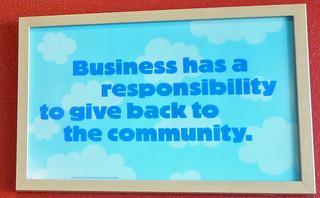
Corporate Social Responsibility (Photo credit: Tom Raftery)
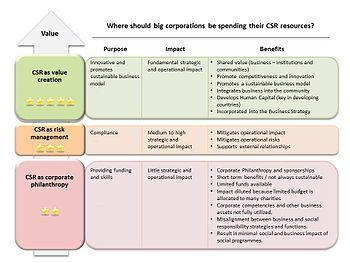
English: CSR approaches CSR framework (Photo credit: Wikipedia)
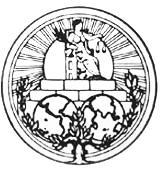
Logo of the United Nations International Court of Justice (ICJ-CJI) (Photo credit: Wikipedia)
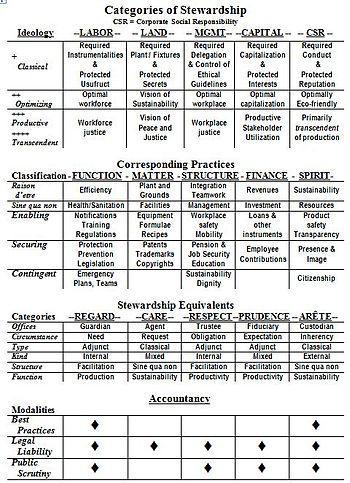
English: Chart depicting the major kinds and interactions of corporate CSR (Corporate Social Responsibility) stewardship functions. (Photo credit: Wikipedia)
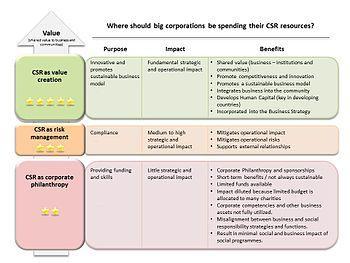
CSR framework (Photo credit: Wikipedia)
Differences in political and legal systems present opportunities and risks for international companies. International managers must understand differences in culture, politics and global legal systems around the world to operate efficiently and effectively. Intellectual property, product safety, and antitrust laws will impact global operations and strategy.
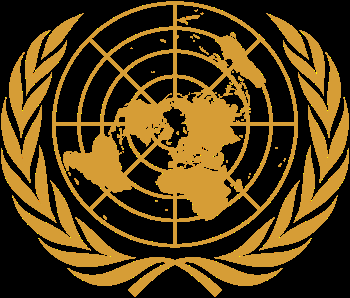
English: Emblem of the United Nations. Color is #d69d36 from the image at http://www.un.org/depts/dhl/maplib/flag.htm (Photo credit: Wikipedia)
International managers are exposed to different conceptions of ethical behavior and guidelines for socially responsible behavior that impact multinational corporations. International managers face ethical dilemmas on a daily basis. Child labor, human rights, the environment, and plant closings are the heart of debates over impact of multinationals.
- According to your textbook, “Ethical Behavior is personal behavior in accordance with guidelines for good conduct or morality. No right or wrong decisions, but alternatives, each of which may be equally valid depending on one’s perspective.”
A firm’s implementation of Corporate Social Responsibility (CSR), goes beyond mere compliance and involves “actions that appear to further some social good, beyond the interests of the firm”.
- According to your text, “Corporate Social Responsibility is the practice of companies going beyond legal obligations to actively balance commitments to investors, customers, other companies, and communities.”
There are 3 layers of CSR activity:
- (1) company works toward a specific social cause;
- (2) company follows a code of conduct and operates with greater transparency;
- (3) company builds social responsibility into its core operations to create value and build competitive advantage.
Companies pursue “green” initiatives to reduce their carbon footprint and also to reduce operating costs and boost profit margins.
Some of the ethical dilemmas that international managers face include: Bribery and Corruption which leads to the misallocation of resources and damages the integrity of the business relationship.
In 2002, Congress passed the Sarbanes-Oxley Act (SOX), which set more stringent accounting standards and reporting practices for U.S. public company boards and accunting firms.
It was named after sponsors U.S. Senator Paul Sarbanes (D-MD) and U.S. Representative Michael G. Oxley (R-OH). As a result,” top management must individually certify the accuracy of financial information.” SOX increased the independence of the outside auditors who review the accuracy of corporate financial statements. SOX was enacted as a reaction to corporate scandals that affected firms like Enron, Tyco International and WorldCom which cost investors billions of dollars when the companies went bankrupt..
International managers and politicians attempt to foster favorable political relationships and enhance the stability of the business environment globally. International intergovernmental organizations and Multilateral trade agreements foster international cooperation.
The UN is an intergovernmental organization established in 1945 primarily to preserve world peace. Its objectives include: “maintaining international peace and security, promoting human rights, fostering social and economic development, protecting the environment, and providing humanitarian aid in cases of famine, natural disaster, and armed conflict.”
Originally, the UN had 51 members, today there are 193 member states.The UN system consists of six main organs: (1) General Assembly; (2) Security Council for initiating resolutions for peace and security; (3) Economic and Social Council for promoting international economic and social cooperation and development; (4) Trusteeship Council; (5) International Court of Justice is the primary judicial organ (6) the Secretariat for providing studies and information. Within the UN Economic and Social Council is the United Nations Conference on Trade and Development (UNCTAD). This organization has a broad mandate in international trade and economic development.The UN has agencies including: the World Bank Group, the World Health Organization, the World Food Programme, UNESCO, and UNICEF.

